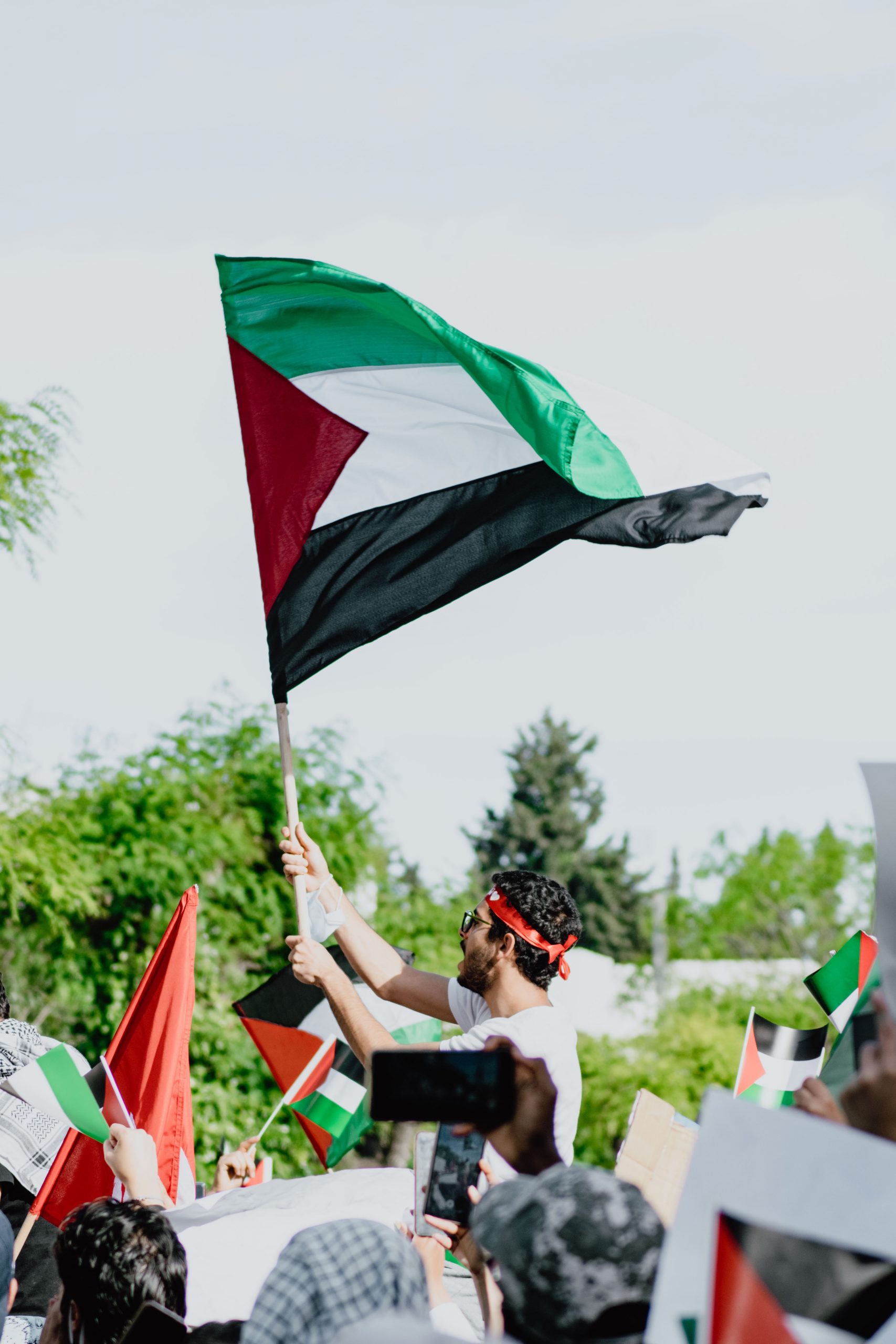#Current Affairs
Palestine: Victory Is Already Here!
Published

Although the title sounds like a clickbait one, I can assure the reader that it is rooted in the Qur’an itself. Permit me the indulgence to explain:
I. The Victory
The Holy Qur’an says:

Keep supporting MuslimMatters for the sake of Allah
Alhamdulillah, we're at over 850 supporters. Help us get to 900 supporters this month. All it takes is a small gift from a reader like you to keep us going, for just $2 / month.
The Prophet (SAW) has taught us the best of deeds are those that done consistently, even if they are small. Click here to support MuslimMatters with a monthly donation of $2 per month. Set it and collect blessings from Allah (swt) for the khayr you're supporting without thinking about it.
Ibn Taymiyyah reminds us that victory (nasr), or being victorious (mansurun), isn’t restricted to the usual sense of the term as in defeating one’s opponent or vanquishing them. He says that it is broader than that. Responding to the objection that how can Allah’s Messengers all be described as victorious when many of them were slain without them or their message of tawhid prevailing, he explains:
‘Being killed, if it is upon a manner wherein there is honour for Islam and its people, then this is from the perfection of victory. For death is inevitable. So if one dies pleased with [Allah 
Taking our queue from this Taymiyyan insight, we can look at what is now happening to the Palestinians in Gaza with a fresh perspective, to see that Allah 
Although the Muslim ummah continues to be woefully divided on a whole host of issues, the Palestinian cause is one around which the entire ummah unifies; and this time, like never before. When hearts are together, and voices resound with a common word, this is a clear victory. (Of course, more meaningful or lasting unity will only come about when we honour the ijma‘-ijtihad rule – i.e. unite upon issues of clear scholarly consensus, and not split over valid scholarly differences.)
The strength and courage with which false narratives undermining Palestinian resistance or the atrocities against them have been skilfully countered this time around, or how the whitewashing of the occupation or its war crimes has been so thoroughly and publicly debunked, is an undeniable victory.
Against the odds, alternative media voices have broken through in a huge way to expose the sheer scale of the double-standards of mainstream media outlets. This cannot be underestimated. Again, it’s a staggering victory. And while such alternative voices have always been there, this time, thanks to social media – in the main – the counter-narrative has gone viral!
From a purely Muslim perspective, there are victories yet greater:
We see how the Palestinian cause serves as a means by which many Muslims are becoming more mindful or tuned to the reality of what it truly means to be a ‘submitter’ to Allah 
More and more Muslims are coming to realise that our socio-political affairs as an ummah are deeply intertwined with us actualisating taqwa in our own lives and turning our backs on sin and disobedience. This ever-growing recognition is one of the greatest victories we could ever be given.
The Palestinian commitment to iman, in the face of all the obstacles, and their courage and optimism in the face of a goliath of persecution, is an inspiration to all who struggle with their faith in these challenging times to also patiently persevere and press on for Allah’s
sake. How can this not be a victory?
As for them being slain, shot or bombed in this resistance for Allah 
II. The Awakening

PC: Latrach Med Jamil (unsplash)
There is an awakening among Muslims, and I find this to be so especially in the younger generation, that we Muslims must be responsive, but not reactionary. In other words, we must duly respond to calamities and tragedies as best as we can, without losing sight of growing our own communities in moral beauty and economic well-being, developing higher institutions of learning, as well as not sacrificing the call to Allah 
Likewise, there is now a far godlier awakening in the ummah that we cannot be attending demonstrations (leaving the scholarly difference about its legality, or its efficacy) and yet not attend to our five daily prayers, and our other personal religious obligations (fara’id). That would be to lose the plot.
There is even an awakening, long in the coming, that our tongues cannot chant protest slogans for Palestinian freedom, more than they invoke the Holy Name of Allah 
There is an awakening that it is not enough just to expose political hypocrisy or media bias and double standards, or get caught up in a tit-for-tat information war. Instead, there is du‘a, prayer, humanitarian aid, deepening our convictions in the Quranic worldview rather than in secular liberalism’s and, of course, da‘wah – our primary objective here, and what validates our living here.
Then there is an awakening about the reality of the conflict, and how it is not about the Jews, per se; nor is it primarily about the actual land being blessed, nor al-Aqsa. Instead, it is about a principle. Imagine, for a moment, if we were to replace the Jews with atheists or Buddhists, and they did exactly the same thing, in exactly the same way. Our duty and response would be exactly the same. Why? Because it isn’t about who the people are. It’s about what they have done and are doing. In other words, the resistance against occupation is based on a principle, not on personalities or peoples. Likewise, if this happened in Mauritania, for instance, and the people were occupied, we would be duty-bound to resist – despite the land not being ‘blessed’ nor having al-Aqsa. That the holy land is blessed, and that it has the third most Sacred Mosque, makes the situation worse. But the principle still stands.
What we might now need is an awakening about boycotting. Again, leaving aside the nuanced scholarly discussion around the validity or not of boycotting (not as a personal act, but as part of a national or transnational coordinated act by those living in Muslim-majority countries with Muslim heads of state) we need to ask: Is it right that I strategically boycott a multinational corporation and get all strict about it, yet not make any serious effort to boycott the clear haram in my own life in terms of what I do, what I say, or what I watch?
The Prophet ﷺ said: ‘The Muslim is one from whom other Muslims are safe from his tongue and hands, and the one who migrates (Ar, muhajir – boycott, shun, flee from, migrate from) is one who boycotts [shuns] what Allah 
Overall, however, there is a godly awakening and a slow, but evolving political maturity; and they too are decisive victories.
III. The Action
Like in other calamities, conflicts or trials of this nature, the plan of action is threefold. There is the immediate or short-term action, the medium-term, and the long term.
Immediate action is, of course, humanitarian aid to the victims and refugees. Money, medical supplies, doctors or other skilled personnel are the types of services and aid the situation needs, as well as contributing to the efforts of relief agencies and humanitarian convoys. Along with this, we must not ignore the power of invoking Allah 
“And what is [the matter] with you that you fight not in the cause of Allah and [for] the oppressed among men, women, and children who say, ‘Our Lord! Rescue us from this town whose people are oppressors! And give us from Your presence a protecting friend; give us from Your presence a defender!’” [Surah An-Nisa – 4:75]
Mid-term action has got to be to work for an immediate ceasefire (the global demonstrations, along with voicing righteous anger, are chiefly about this), so that aid and humanitarian relief can get through and some semblance of peace and security is established. Mid-term does not mean that one works for it only after the humanitarian aid is delivered. A ceasefire or cessation of bombing and killing must be brokered now.
As to the long-term action, this is about finding a resolution to the conflict and occupation. For Muslims, that involves being wisely guided by the light of sound religious instruction and realpolitik. For while the fire in some hearts is seasoned, and in others yet young, believers must be steered – even in their politics – by sacred knowledge. For however they move, and in whatever they do, the believer seeks the glory of God and must intend to conform to His Will and ways.
Two sacred principles must be kept in mind here; both are backed up by a classical scholarly consensus. The first is that women, children and all other non-combatants cannot be intentionally targeted and killed in any war or resistance.3The shari‘ah proofs for this are discussed in my article, Jihad & Martyrdom, War & Peace: https://thehumblei.com/2017/03/16/jihad-martyrdom-war-peace/
The second is that affairs of war or peace (and whatever is in between) are the decision of those in whose hand is the executive political authority4The proofs are discussed in the article above. – in this case, the political leaders of the West Bank and, separately, the Gaza Strip. The former accepts the premise of a two-state solution; the Palestinian state being on that of the 1967 borders. The latter has changed its original 1988 position, and as of 2017, also accepts a Palestinian state on the 1967 borders. For, while all Palestinians dream of liberating historic Palestine, today, those at the helm of Palestinian governance are working on a realistic solution. They are focused on what they can achieve, as opposed to what they dream for.
Both authorities expect such a state to be fully sovereign and autonomous, and with the right of return. And despite the skewered propaganda about this too, such a state and with the right of return is – with all its multifaceted concerns and complexities – theoretically doable.
Of course, this will depend on the occupiers, the heads of which still voice a number of positions. These range from a suggestive genocide of Palestinians, to driving them out to neighbouring states, all the way to a two-state, toothless tiger solution.
The hope is that the resistance, whatever it does, takes the moral high ground and does not eclipse the long-term call to tawhid for short-term political gains. For as long as we continue wearing the uniform of iman and humility, Allah 
That is our conviction!
[This article was first published here]
Related reading:
Keep supporting MuslimMatters for the sake of Allah
Alhamdulillah, we're at over 850 supporters. Help us get to 900 supporters this month. All it takes is a small gift from a reader like you to keep us going, for just $2 / month.
The Prophet (SAW) has taught us the best of deeds are those that done consistently, even if they are small. Click here to support MuslimMatters with a monthly donation of $2 per month. Set it and collect blessings from Allah (swt) for the khayr you're supporting without thinking about it.
Abu Aaliyah is the founder of The Jawziyyah Institute, a leading institute for Islamic moderation and contemporary thought in the United Kingdom. Sidi Abu Aaliyah has been in involved in Dawah and Islamic teachings since 1986. He has translated a number of books from the Arabic language into English such as "The Exquisite Pearls". Abu Aaliyah's written works and audio lectures can be found online.


The Sandwich Carers: Navigating The Islamic Obligation Of Eldercare

Far Away [Part 4] – A Safe Place

Why I Can’t Leave Surah Al-Mulk Hanging Every Night

The Muslim Book Awards 2025 Winners

Op-Ed: Understanding The Somaliland Recognition Decision – A Counterargument To The Prevailing Muslim Consensus

Restoring Balance In An Individualized Society: The Islamic Perspective on Parent-Child Relationships

Ahmed Al-Ahmed And The Meaning Of Courage

Faith and Algorithms: From an Ethical Framework for Islamic AI to Practical Application

Far Away [Part 1] – Five Animals

The Limits Of Obedience In Marriage: A Hanafi Legal Perspective

[Dhul Hijjah Series] Calling Upon the Divine: The Art of Du’a (Part 1)

IOK Ramadan 2025: Four Steps | Sh Zaid Khan

IOK Ramadan 2025: Do Your Best | Sh Zaid Khan

IOK Ramadan 2025: Giving Preference to Others | Sh Zaid Khan

IOK Ramadan 2025: Which Group Are We In? | Sh Zaid Khan
Trending
-
#Islam3 weeks ago
Restoring Balance In An Individualized Society: The Islamic Perspective on Parent-Child Relationships
-
#Current Affairs4 weeks ago
Ahmed Al-Ahmed And The Meaning Of Courage
-
#Life1 month ago
AI And The Dajjal Consciousness: Why We Need To Value Authentic Islamic Knowledge In An Age Of Convincing Deception
-
#Culture1 month ago
Moonshot [Part 32] – FINAL CHAPTER: A Man On A Mission











usman siddiqi
November 20, 2023 at 7:56 AM
What an insightfull article. May we all seek the right path.